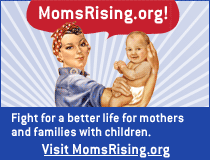

Okay everyone, the MomsRising.org site is up. This is the start of our best chance right now of lighting a fire around family issues. Visit the site. It's filled with info, and ideas about real organizing and politics. You can also download the first chapter of The Motherhood Manifesto, by Joan Blades and Kristin Rowe-Finkbeiner. When the technology gets figured out, yours truly will be sending Playground Revolution entries over, which is my way of saying once again that I adore Joan and Kristin, and I think they are on the right track. Not everyone, as we know, gets a smile from the Playground Revolution.
And because it's spring and because we need messages out there even when we can't talk three sentences without interruption, buy yourself and those you love one of the fabulous Rosie-the-Riveter plus baby T-shirts with a Moms Rising logo. I'm ordering one tonight. Here's the T-shirt order site.
You know, I get many emails asking me to pitch products. I pretty much reject them all, especially as of late, asI've decided to not accept advertising on this blog. You can trust that if I recommend something, it comes from my true admiration and desire. Let's keep the roll going. While you've got the credit card out, head over to Rebel Dad--which is my favorite site these days, and if I go for too long without posting because life with a baby is so busy, know that Rebel Dad is probably saying whatever I would be saying, so read Rebel Dad. And then check out his line of Rebel Dad clothes. There's a Rebel Dad flask there, too. Can we predictthat such a flask, properly filled, will lighten the mood at your kids' baseball games, soccer matches and swim meets, especially if you share it with other parents. The RebelDad T will be a Father's Day present for the guy in my life.
The light pink Rebel Mom is a keeper, too. Especially now that I've gotten over my pink fetish.